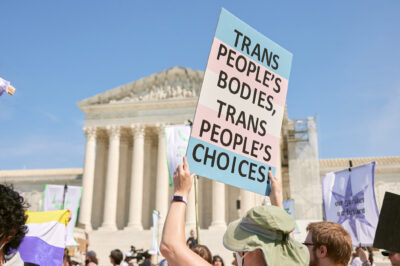Ő“◊” ”∆ĶComment on U.S. Department of Education‚Äôs Final Title IX Rule
WASHINGTON ‚ÄĒ The U.S. Department of Education issued a today governing schools‚Äô obligations to guarantee that all students, including survivors of sexual harassment, LGBTQ students, and pregnant and parenting students, have full and equal access to educational opportunities regardless of sex.
In response to this news, Louise Melling, Ő“◊” ”∆Ķdeputy legal director, had the following reaction:
“At a critical time, when trans youth are being used by politicians as a punching bag, the final rule issues an important reminder that schools cannot discriminate based on gender identity, transgender status, or sexual orientation. We also applaud the final rule’s inclusion of guidance on the rights of pregnant and parenting students and school employees. All students have the right to an equal opportunity to learn in school without being discriminated against on the basis of sex or sex stereotypes.
‚ÄúThe rule also includes important provisions that require schools to address and investigate complaints of sexual harassment, restoring standards that were in place for decades and that mirror those used for other forms of harassment. However, it falls short by failing to mandate certain procedural protections that complainants and respondents should have in university disciplinary proceedings. The Ő“◊” ”∆Ķwill remain committed to ensuring schools are doing everything in their power to safeguard students from sexual harassment and violence and ensuring fair process in school disciplinary proceedings.‚ÄĚ
The Ő“◊” ”∆Ķsupports the provisions in the final regulation that:
- Make clear that Title IX covers harassment and discrimination based on sexual orientation, gender identity, and sex stereotypes;
- Restore the longstanding ‚Äúsevere or pervasive‚ÄĚ standard for sex-based harassment
- Require schools to investigate instances of student-on-student harassment or assaults that occur off campus where they affect students’ access to education;
- Hold institutions accountable when they fail to take prompt and effective action to end sex discrimination;
- Clarify that parties should be able to access relevant evidence while limiting access to irrelevant or privileged evidence;
- Clarify that in the limited circumstances where Title IX’s regulations permit differential treatment or separation on the basis of sex, that differential treatment cannot prevent a person who is transgender from participating in an educational program or activity consistent with the person’s gender identity;
- Clarify the definition of discrimination based on status as a parent to include a range of individuals with caregiving responsibilities for children; and
- Make clear that the existing prohibition on pregnancy discrimination includes discrimination based on lactation and requires recipients to provide a clean lactation space and break time to express milk for both students and employees.
The Ő“◊” ”∆Ķopposes the provisions in the final regulation that:
- Do not require universities to provide a live hearing and an opportunity for cross-examination where serious sanctions, such as suspension or expulsion, may apply;
- Permit universities to use the single investigator model, where a single person investigates a complaint and makes the decision about the outcome; and
- Do not require institutions to delay Title IX proceedings upon the request of a respondent who faces an imminent or ongoing criminal investigation or prosecution.
The Title IX final rule can be found here:
The ACLU’s written comments on the proposed rule can be found here: /documents/aclu-comments-response-proposed-rule-nondiscrimination-basis-sex-education-programs-or-activities




